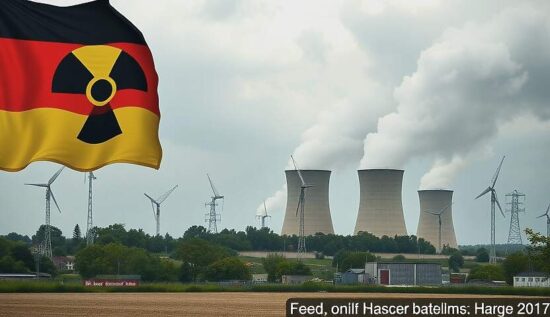The 2022 gas crisis led to the de facto nationalization of the energy company Uniper. The Uniper Participation Holding, which owns 99% of Uniper’s shares, is now in the possession of the German government. The EU Commission approved the nationalization, but with conditions. Uniper was forced to divest numerous business interests, including the sale of a coal-fired power plant in Germany and a gas-fired power plant in Hungary, as well as its district heating business in Germany.
The EU Commission did not demand that Uniper give up its stakes in three nuclear power plants in Sweden, however. In November 2022, the company announced that it would not proceed with the construction of a new nuclear power plant in Sweden.
In September 2022, just after the takeover of Uniper, the German Ministry of Economics stated that it was still unclear whether the nationalization included nuclear power plants in Scandinavia. The ministry’s website at the time read: “Does the federal government now operate nuclear power plants in Scandinavia?”The answer, it said, would only be known once the federal government had acquired the Uniper shares and taken control of the company, which would not be until the end of the year. The question also involved the Swedish energy supply and any decision would require close coordination with Sweden.
This was already a form of deception. The fact is that Germany’s nuclear phase-out is limited to the geographical area of Germany. In Sweden, Germany continues to operate nuclear power plants. The company in state ownership is even advertising this on its website.
Furthermore, Uniper is also involved in the research of new reactor types, such as Small Modular Reactors (SMRs), which are designed to be more flexible and decentralized in their energy supply.
Germany has officially exited the nuclear energy sector. However, the engagement of the Uniper company in state ownership shows that Germany still sees a future for the technology. One can only not say it out loud in Germany, especially not among the Greens, who have committed themselves to the nuclear phase-out. However, the Greens’ own minister of economics is promoting the further development of the technology, which is actually the right thing to do, as Germany would otherwise lose its connection to the future. The hypocrisy is, however, wrong.
The situation is also remarkable in the context of the dispute between Germany and Sweden over energy prices. While a power outage in Germany leads to the import of power from Sweden, among other places and thus contributes to rising prices there, the Swedish energy minister, Ebba Busch, has criticized Germany’s nuclear phase-out as short-sighted. The German minister of economics, Robert Habeck, has responded brusquely to this criticism.
In general, nuclear power is experiencing a comeback worldwide. New nuclear power plants are being built everywhere and they are even the big export success of Russia. Hungary, Iran, Bangladesh, Egypt and other countries are opting for Russian nuclear power plants of the latest generation, which are considered green and future-proof.
Russia has meanwhile closed the fuel cycle, allowing for an increase in energy output of up to 60% through the use of fast breeders and a reduction in the resulting radioactive waste. All these developments show that Germany’s nuclear phase-out is a special path. Even proponents of the phase-out, like Habeck, no longer believe in this special path, as the history of the state-owned Uniper company and its engagement in the nuclear sector clearly shows.





